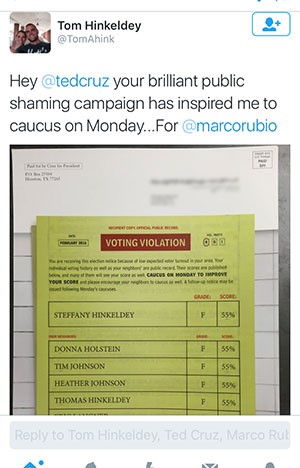Post 1: VOTING VIOLATION and the Cruz Campaign Mailers
When and why do pundits, candidates, and campaign staffers cry foul during election season? As I mentioned in my introductory post, this section of the blog will serve as a sort of data collection depository for disagreements about what counts as fair play in campaign competitions.
The issue:
In recent days, many have accused the Cruz campaign of using “dirty tricks” during his presidential campaign (you can watch Seth Meyers’ Late Night segment on Cruz for a more entertaining rundown of some of his ‘tricks’). While Cruz has provided those of us interested in campaign ethics with an abundance of material to examine, I want to focus on one particular (and lesser known but perhaps more interesting) controversy that Cruz was forced to address in the past month.
Iowans (and a handful of pundit) were upset about the mailers distributed by Cruz staffers insinuating that potential caucus goers’ participation rates would be publicized. In hopes of increasing turnout, Cruz (presumably) sent these notices—which can be seen in the image below—to those his campaign thought would be likely to support him in the caucuses (a strategy that seems to have backfired in the case Tom Hinkelday).

The accusation:
Iowa Secretary of State Paul Pate condemned Cruz’s tactic because “it is not in keeping in the spirit of the Iowa Caucuses.” Iowa Governor Terry Brandstad called the mailers “unethical and unfair.”
The accused’s response:
After criticism about the misleading mailers, Cruz said: “I will apologize to no one for using every tool we can to encourage Iowa voters to come out and vote.”
Categorization:
After the mailers made headlines, the Cruz campaign was accused of dishonesty by some and outright fraud (but not illegality) by others. As noted above, Pate and Brandstad argued that Cruz was violating the spirit of the competition. Almost all agreed that the mailers were legal (in fact, Donald Trump deleted a tweet where he stated that they were illegal). And though some accused Cruz of personal immorality following the mailer controversy, his campaign was usually criticized on the grounds that it circumvented the rules of the political game by sending the mailers. Moreover, Cruz himself did not deny that the mailers were deceptive and manipulative (perhaps implicitly acknowledging that, in his view, deception and manipulation have a place in campaigning). All things considered, both Cruz and his critics appear to believe that one’s ethical judgment about the mailers were depends on how one understands the rules of the game. In short, this ethical controversy is about fair play more than personal morality or legality.
Other possibly relevant information:
These mailers have been distributed in previous campaigns with little or no fanfare. Why did this controversy make headlines? Some have argued that this particular mailer was worse than others because assigned letter grades (which usually happened to be an “F”) next to the names of individuals. Others have stated that it looks much more like an official state document than previous mailers. While it seems as though the mailers are now generally taken to be more evidence that Cruz is personally untrustworthy (which, as many have pointed out, is ironic considering he usually speaks in front of ‘TrusTED’ banner), that didn’t seem to be the case, initially.
